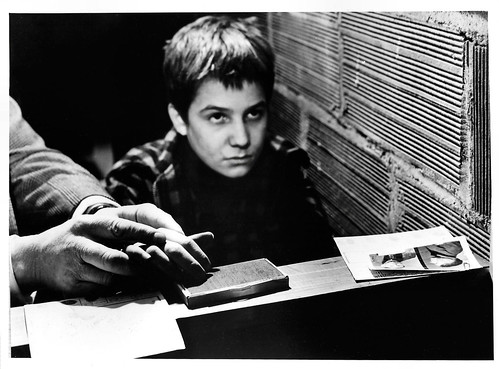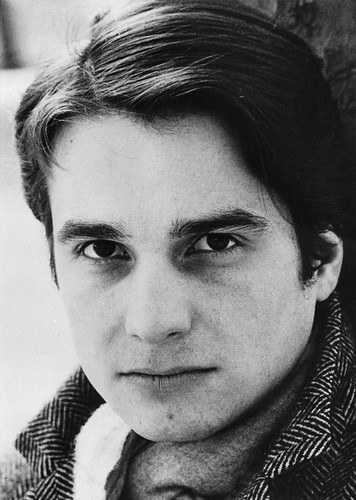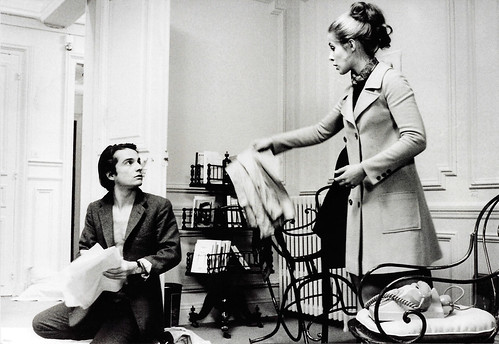French actor Jean-Pierre Léaud (1944) is best known for playing Antoine Doinel in Les Quatre Cents Coups/The 400 Blows (1959) and François Truffaut's following series of films about that character. He also worked several times with Jean-Luc Godard and is one of the icons of the French New Wave. He is known for his staccato diction.

French postcard by Editions du Globe, Paris, no. 870. Photo: Studio Vauclair, Paris.

East-German postcard by VEB Progress Film-Vertrieb, Berlin, no. 208/71, 1971. Photo: Linke.

French postcard by Editions Le Malibran, Paris, no. CF 31. Photo: P. Lhomme. Jean-Pierre Léaud, Françoise Lebrun and Bernadette Lafont in La Maman et la Putain (Jean Eustache, 1973).
Jean-Pierre Léaud was born in Paris in 1944. He was the son of an assistant scriptwriter, Pierre Léaud, and the actress Jacqueline Pierreux. Léaud made his major debut as an actor at the age of 14 as Antoine Doinel, a semi-autobiographical character based on the life events of French film director François Truffaut, in his debut film Les Quatre Cents Coups/The 400 Blows (1959). To cast the two adolescents, Truffaut published an announcement in the newspaper France-Soir and auditioned several hundred children in September and October 1958. Jean Domarchi, a critic at the film magazine Cahiers du cinéma, recommended Léaud.
Truffaut was immediately captivated by the fourteen-year-old adolescent, who had already appeared with Jean Marais in the Swashbuckler La Tour, prends garde !/The Tower, watch out! (Georges Lampin, 1958). Jean-Pierre Léaud, then in the eighth grade at a private school in Pontigny, was a far-from-ideal student. He often ran away with the older students on their nights out, but he could also be brilliant, generous, and affectionate.
During and following the filming of Les Quatre Cents Coups/The 400 Blows (1959), Truffaut's concern for Léaud extended beyond the film set. He took charge of the difficult adolescent's upbringing after Léaud was expelled from school and kicked out of the home of the retired couple taking care of him. Truffaut subsequently rented a studio apartment for Léaud. Truffaut also hired him for assistant work on La peau douce/The Soft Skin (François Truffaut, 1964) and Mata Hari, Agent H21 (François Truffaut, 1964).
After the short-film Antoine et Colette (François Truffaut, 1962), a segment of the anthology film L'amour à vingt ansLove at 20 (1962), Léaud starred in four more Truffaut films depicting the life of Doinel, spanning 20 years. Those films are Baisers volés/Stolen Kisses (François Truffaut, 1968), Domicile conjugal/Bed and Board (François Truffaut, 1970) and L'amour en fuite/Love on the Run (François Truffaut, 1979), all with Claude Jade as his girlfriend, wife or ex.
He also collaborated with Truffaut on non-Antoine Doinel films like Les Deux Anglaises et le Continent/Two English Girls (François Truffaut, 1971) and La Nuit américaine/Day for Night (François Truffaut, 1973) and became the actor most commonly affiliated with him. Although Antoine Doinel is his most familiar character, he often found his performances in other films to be compared to his Doinel character, whether there were legitimate similarities or not.

German press photo by Bildarchiv Engelmeier, München. Jean-Pierre Léaud in Les Quatre Cents Coups/The 400 Blows (François Truffaut, 1959).

German press photo by Bildarchiv Engelmeier, München. Issued for broadcasting by the ZDF on 8 January 1998. Jean-Pierre Léaud, Albert Remy and Claire Maurier in Les quatre cents coups/The 400 Blows (François Truffaut, 1959).

German press photo by Tele Bunk ttv, Berlin. Issued for broadcasting by the ZDF on 8 January 1998. Jean-Pierre Léaud in Les quatre cents coups/The 400 Blows (François Truffaut, 1959).

German press photo by Kövesdi Presse Agentur, München (Munich). Used for the German broadcasting by ZDF in 1983. Jean-Pierre Léaud in Antoine et Colette/Antoine and Colette (François Truffaut, 1962).

German press photo by ORF. Used for the German broadcasting of the film in 1994. Jean-Pierre Léaud in Baisers volés/Stolen Kisses (François Truffaut, 1968).
Jean-Pierre Léaud is one of the most visible and well-known actors to be associated with the Nouvelle Vague, the French New Wave film movement and, aside from his work with Truffaut, he collaborated with Jean-Luc Godard (on nine films), Jean Eustache, Jacques Rivette and Agnès Varda.
In 1966, he won the Silver Bear for Best Actor at the Berlin International Film Festival for his role in Masculin Féminin (Jean Luc Godard, 1966). He was in Pier Paolo Pasolini's Porcile/Pigsty (1968), in Jerzy Skolimowski’s Dialog 20-40-60/Dialogue 20-40-60 (1968), Brazilian Carlos Diegues' Os herdeiros/The Heirs (1970) and Glauber Rocha's Der Leone have sept cabeças/The Lion Has Seven Heads (1971).
The early 1970s was perhaps the peak of his professional career when he had three critically acclaimed films released: Bernardo Bertolucci's Ultimo tango a Parigi/Last Tango in Paris (1972), Truffaut's La Nuit américaine/Day for Night (1973), and Jean Eustache's La Maman et la Putain/The Mother and the Whore (1973) with Bernadette Lafont. In the Bertolucci film, Léaud appeared in the same film as a hero of his, Marlon Brando, although the two men never met, since all of Léaud's scenes were shot on Saturdays and Brando refused to work on Saturdays.
In 1988, Léaud was nominated for a César Award for Best Supporting Actor for the comedy Les Keufs/Lady Cops (Josiane Balasko, 1987) and was awarded an Honorary César for lifetime achievement in 2000. He made an exciting comeback in the nineties when several ‘new New Wave’ directors hired Léaud to pay homage to their elders. Among them are French filmmakers such as Olivier Assayas, Danièle Dubroux, Serge Le Péron, and Bertrand Bonello and foreigners like Finnish Aki Käurismäki and Taiwanese Tsai Ming-Liang.
In 2016, Léaud received the Honorary Palme d'Or at the 2016 Cannes Film Festival, and in 2017, he won the Lumières Award for Best Actor for his role in the historical drama La Mort de Louis XIV/The Death of Louis XIV (Albert Serra, 2017). Jean-Pierre Léaud is married to the French actress Brigitte Duvivier.

German press photo.

German press photo by ORF. Released for broadcasting on 1 October 1994. Jean-Pierre Léaud and Claude Jade in Domicile Conjugal (François Truffaut, 1970).

German press photo by Goepfert Arthur, Tessin, Barbengo / Films du Carrosse / Valoria Films, Paris / Fida Cinematografica, Rome. Jean-Pierre Léaud in Domicile Conjugal (François Truffaut, 1970).

German press photo by Goepfert Arthur, Tessin, Barbengo / Films du Carrosse / Valoria Films, Paris / Fida Cinematografica, Rome. Jean-Pierre Léaud and Hiroko Berghauer in Domicile Conjugal (François Truffaut, 1970).

German press photo by K.P.A., Düsseldorf. The photo was used for a broadcast by NDR/RB/SFB Fernsehen III at 27 and 28 December 1972.

German press photo. Photo: defd / Foto Engelmeier, München. Jacqueline Bisset and Jean-Pierre Léaud in La nuit américaine/Day for Night (François Truffaut, 1973). The press photo was used for the German broadcasting of the film by the ARD on 20 December 1981.

German press photo. Photo: Felicitas Timpe, München. Jean-Pierre Léaud in Umarmungen und andere Sachen/Embraces (Jochen Richter, 1975). Issued for the broadcasting of the film by the ARD on 4 October 1977.

German press photo. Photo: Felicitas Timpe, München. Anny Duperey, Jean-Pierre Léaud and Sydne Rome in Umarmungen und andere Sachen/Embraces (Jochen Richter, 1975).

German press photo. Jean-Pierre Léaud in L'amour en fuite/Love on the Run (François Truffaut, 1979).
Sources: Guy Bellinger (IMDb), Wikipedia and IMDb.
This post was last updated on 7 March 2025.

French postcard by Editions du Globe, Paris, no. 870. Photo: Studio Vauclair, Paris.

East-German postcard by VEB Progress Film-Vertrieb, Berlin, no. 208/71, 1971. Photo: Linke.

French postcard by Editions Le Malibran, Paris, no. CF 31. Photo: P. Lhomme. Jean-Pierre Léaud, Françoise Lebrun and Bernadette Lafont in La Maman et la Putain (Jean Eustache, 1973).
Becoming Antoine Doinel
Jean-Pierre Léaud was born in Paris in 1944. He was the son of an assistant scriptwriter, Pierre Léaud, and the actress Jacqueline Pierreux. Léaud made his major debut as an actor at the age of 14 as Antoine Doinel, a semi-autobiographical character based on the life events of French film director François Truffaut, in his debut film Les Quatre Cents Coups/The 400 Blows (1959). To cast the two adolescents, Truffaut published an announcement in the newspaper France-Soir and auditioned several hundred children in September and October 1958. Jean Domarchi, a critic at the film magazine Cahiers du cinéma, recommended Léaud.
Truffaut was immediately captivated by the fourteen-year-old adolescent, who had already appeared with Jean Marais in the Swashbuckler La Tour, prends garde !/The Tower, watch out! (Georges Lampin, 1958). Jean-Pierre Léaud, then in the eighth grade at a private school in Pontigny, was a far-from-ideal student. He often ran away with the older students on their nights out, but he could also be brilliant, generous, and affectionate.
During and following the filming of Les Quatre Cents Coups/The 400 Blows (1959), Truffaut's concern for Léaud extended beyond the film set. He took charge of the difficult adolescent's upbringing after Léaud was expelled from school and kicked out of the home of the retired couple taking care of him. Truffaut subsequently rented a studio apartment for Léaud. Truffaut also hired him for assistant work on La peau douce/The Soft Skin (François Truffaut, 1964) and Mata Hari, Agent H21 (François Truffaut, 1964).
After the short-film Antoine et Colette (François Truffaut, 1962), a segment of the anthology film L'amour à vingt ansLove at 20 (1962), Léaud starred in four more Truffaut films depicting the life of Doinel, spanning 20 years. Those films are Baisers volés/Stolen Kisses (François Truffaut, 1968), Domicile conjugal/Bed and Board (François Truffaut, 1970) and L'amour en fuite/Love on the Run (François Truffaut, 1979), all with Claude Jade as his girlfriend, wife or ex.
He also collaborated with Truffaut on non-Antoine Doinel films like Les Deux Anglaises et le Continent/Two English Girls (François Truffaut, 1971) and La Nuit américaine/Day for Night (François Truffaut, 1973) and became the actor most commonly affiliated with him. Although Antoine Doinel is his most familiar character, he often found his performances in other films to be compared to his Doinel character, whether there were legitimate similarities or not.

German press photo by Bildarchiv Engelmeier, München. Jean-Pierre Léaud in Les Quatre Cents Coups/The 400 Blows (François Truffaut, 1959).

German press photo by Bildarchiv Engelmeier, München. Issued for broadcasting by the ZDF on 8 January 1998. Jean-Pierre Léaud, Albert Remy and Claire Maurier in Les quatre cents coups/The 400 Blows (François Truffaut, 1959).

German press photo by Tele Bunk ttv, Berlin. Issued for broadcasting by the ZDF on 8 January 1998. Jean-Pierre Léaud in Les quatre cents coups/The 400 Blows (François Truffaut, 1959).

German press photo by Kövesdi Presse Agentur, München (Munich). Used for the German broadcasting by ZDF in 1983. Jean-Pierre Léaud in Antoine et Colette/Antoine and Colette (François Truffaut, 1962).

German press photo by ORF. Used for the German broadcasting of the film in 1994. Jean-Pierre Léaud in Baisers volés/Stolen Kisses (François Truffaut, 1968).
An exciting comeback
Jean-Pierre Léaud is one of the most visible and well-known actors to be associated with the Nouvelle Vague, the French New Wave film movement and, aside from his work with Truffaut, he collaborated with Jean-Luc Godard (on nine films), Jean Eustache, Jacques Rivette and Agnès Varda.
In 1966, he won the Silver Bear for Best Actor at the Berlin International Film Festival for his role in Masculin Féminin (Jean Luc Godard, 1966). He was in Pier Paolo Pasolini's Porcile/Pigsty (1968), in Jerzy Skolimowski’s Dialog 20-40-60/Dialogue 20-40-60 (1968), Brazilian Carlos Diegues' Os herdeiros/The Heirs (1970) and Glauber Rocha's Der Leone have sept cabeças/The Lion Has Seven Heads (1971).
The early 1970s was perhaps the peak of his professional career when he had three critically acclaimed films released: Bernardo Bertolucci's Ultimo tango a Parigi/Last Tango in Paris (1972), Truffaut's La Nuit américaine/Day for Night (1973), and Jean Eustache's La Maman et la Putain/The Mother and the Whore (1973) with Bernadette Lafont. In the Bertolucci film, Léaud appeared in the same film as a hero of his, Marlon Brando, although the two men never met, since all of Léaud's scenes were shot on Saturdays and Brando refused to work on Saturdays.
In 1988, Léaud was nominated for a César Award for Best Supporting Actor for the comedy Les Keufs/Lady Cops (Josiane Balasko, 1987) and was awarded an Honorary César for lifetime achievement in 2000. He made an exciting comeback in the nineties when several ‘new New Wave’ directors hired Léaud to pay homage to their elders. Among them are French filmmakers such as Olivier Assayas, Danièle Dubroux, Serge Le Péron, and Bertrand Bonello and foreigners like Finnish Aki Käurismäki and Taiwanese Tsai Ming-Liang.
In 2016, Léaud received the Honorary Palme d'Or at the 2016 Cannes Film Festival, and in 2017, he won the Lumières Award for Best Actor for his role in the historical drama La Mort de Louis XIV/The Death of Louis XIV (Albert Serra, 2017). Jean-Pierre Léaud is married to the French actress Brigitte Duvivier.

German press photo.

German press photo by ORF. Released for broadcasting on 1 October 1994. Jean-Pierre Léaud and Claude Jade in Domicile Conjugal (François Truffaut, 1970).

German press photo by Goepfert Arthur, Tessin, Barbengo / Films du Carrosse / Valoria Films, Paris / Fida Cinematografica, Rome. Jean-Pierre Léaud in Domicile Conjugal (François Truffaut, 1970).

German press photo by Goepfert Arthur, Tessin, Barbengo / Films du Carrosse / Valoria Films, Paris / Fida Cinematografica, Rome. Jean-Pierre Léaud and Hiroko Berghauer in Domicile Conjugal (François Truffaut, 1970).

German press photo by K.P.A., Düsseldorf. The photo was used for a broadcast by NDR/RB/SFB Fernsehen III at 27 and 28 December 1972.

German press photo. Photo: defd / Foto Engelmeier, München. Jacqueline Bisset and Jean-Pierre Léaud in La nuit américaine/Day for Night (François Truffaut, 1973). The press photo was used for the German broadcasting of the film by the ARD on 20 December 1981.

German press photo. Photo: Felicitas Timpe, München. Jean-Pierre Léaud in Umarmungen und andere Sachen/Embraces (Jochen Richter, 1975). Issued for the broadcasting of the film by the ARD on 4 October 1977.

German press photo. Photo: Felicitas Timpe, München. Anny Duperey, Jean-Pierre Léaud and Sydne Rome in Umarmungen und andere Sachen/Embraces (Jochen Richter, 1975).

German press photo. Jean-Pierre Léaud in L'amour en fuite/Love on the Run (François Truffaut, 1979).
Sources: Guy Bellinger (IMDb), Wikipedia and IMDb.
This post was last updated on 7 March 2025.
No comments:
Post a Comment